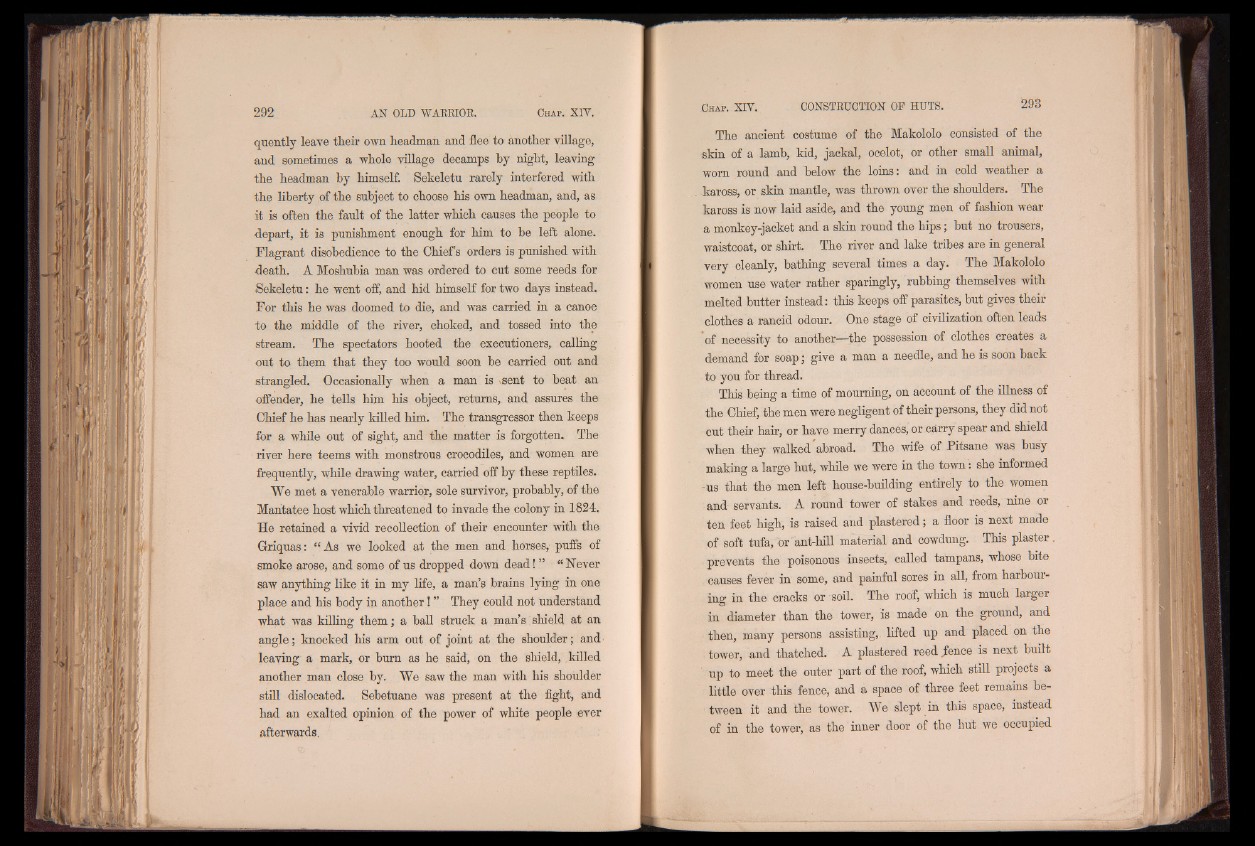
quently leave their own headman and flee to another village,
and sometimes a whole village decamps by night, leaving
the headman by himself. Sekeletu rarely interfered with
the liberty of the subject to choose his own headman, and, as
it is often the fault of the latter which causes the people to
depart, it is punishment enough for him to be left alone.
Flagrant disobedience to the Chiefs orders is punished with
death. A Moshubia man was ordered to cut some reeds for
Sekeletu: he went off, and hid himself for two days instead.
For this he was doomed to die, and was carried in a canoe
to the middle of the river, choked, and tossed into the
stream. The spectators hooted the executioners, calling
out to them that they too would soon be carried out and
strangled. Occasionally when a man is vsent to beat an
offender, he tells him his object, returns, and assures the
Chief he has nearly killed him. The transgressor then keeps
for a while out of sight, and the matter is forgotten. The
river here teems with monstrous crocodiles, and women are
frequently, while drawing water, carried off by these reptiles.
We met a venerable warrior, sole survivor, probably, of the
Mantatee host which threatened to invade the colony in 1824,
He retained a vivid recollection of their encounter with the
Griquas: “ As we looked at the men and horses, puffs of
smoke arose, and some of us dropped down dead! ” “ Never
saw anything like it. in my life, a man’s brains lying in one
place and his body in another! ” They could not understand
what was killing them; a ball struck a man’s shield at an
angle; knocked his arm out of joint at the shoulder; and
leaving a mark, or bum as he said, on the shield/ killed
another man close by. We saw the man with his shoulder
still dislocated. Sebetuane was present at the fight, and
had an exalted opinion of the power of white people ever
afterwards.
The ancient costume of the Makololo consisted of the
K i r i n of a lamb, kid, jackal, ocelot, or other small animal,
worn round and below the loins: and in cold weather a
kaross, or skin mantle, was thrown over the shoulders. The
kaross is now laid aside, and the young men of fashion wear
a monkey-jacket and a skin round the hips; but no trousers,
waistcoat, or shirt. The river and lake tribes are in general
very cleanly, bathing several times a day. The Makololo
women use water rather sparingly, rubbing themselves with
melted butter instead: this keeps off parasites, but gives their
clothes a rancid odour. One stage of civilization often leads
of necessity to another—the possession of clothes creates a
demand for soap; give a man a needle, and he is soon back
to you for thread.
This being a time of mourning, on account of the illness of
the Chief, the men were negligent of their persons, they did not
cut their hair, or have merry dances, or carry spear and shield
when they walked abroad. The wife of Pitsane was busy
making a large hut, while we were in the town: she informed
-us that the men left house-building entirely to the women
and servants. A round tower of stakes and reeds, nine or
ten feet high, is raised and plastered; a floor is next made
of soft tufa, or ant-hill material and cowdung. This plaster
prevents the poisonous insects, called tampans, whose bite
causes fever in some, and painful sores in all, from harbouring
in the cracks or soil. The roof, which is much larger
in diameter than the tower, is made on the ground, and
then, many persons assisting, lifted up and placed on the
tower, and thatched. A plastered reed .fence is next built
up to meet the outer part of the roof, which still projects a
little over this fence, and a space of three feet remains between
it and the tower. We slept in this space, instead
of in the tower, as the inner door of the hut we occupied